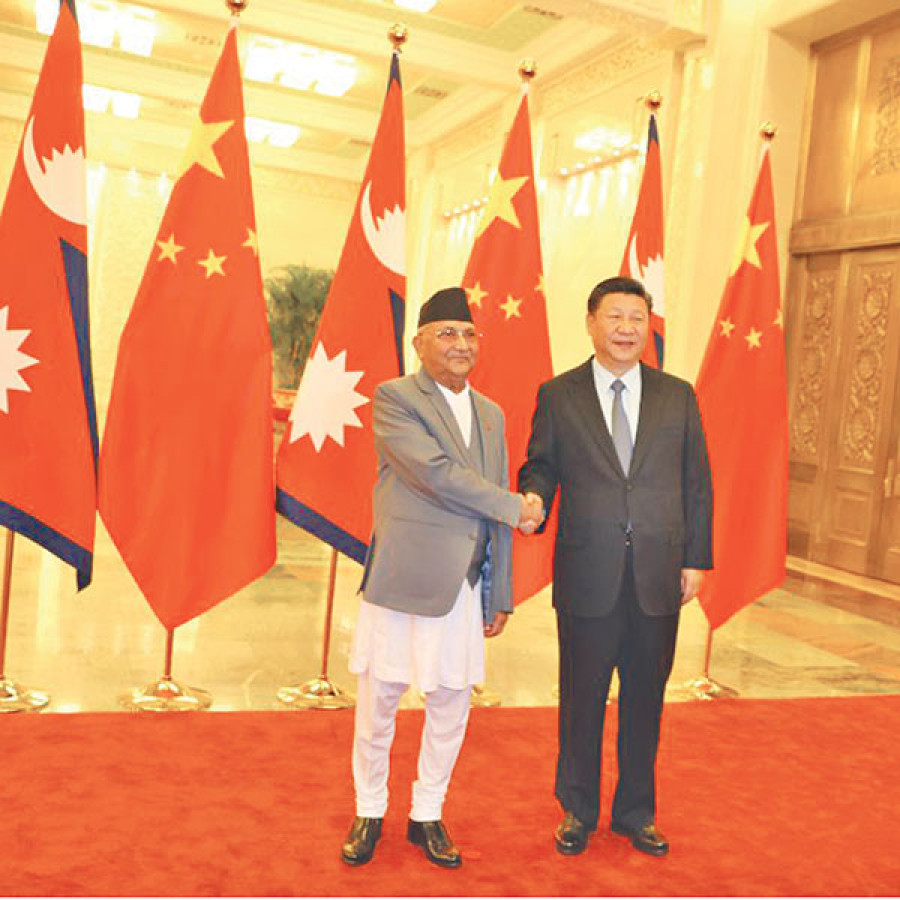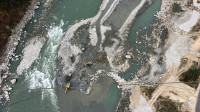National
Oli, Xi strike strong personal rapport
It is perhaps too early to tell the significance of Prime Minister KP Oli’s current China visit, his second in two years to the Middle Kingdom as head of government.
Akhilesh Upadhyay
It is perhaps too early to tell the significance of Prime Minister KP Oli’s current China visit, his second in two years to the Middle Kingdom as head of government.
But there are clear signs that this visit could very well be the turning point in shaping Nepal-China relationship and developing it beyond the platitudes and promises of shared mountains and common rivers. This visit will potentially shape Nepal’s foreign policy narrative for years to come. Mooted in the current visit, the Trans-Himalayan Multidimensional Network is an ambitious agenda of connectivity and blueprint for new regionalism where geography is not a barrier for a deeper engagement.
First and foremost, after years of discussions and speculations, the railways linking Kathmandu with the Chinese town of Kerung seems to be taking a definite shape. In the delegation-level talks held at the Great Hall of the People on Wednesday, Chinese President Xi Jinping assured Prime Minister Oli and his team that he is keen to see the Nepal-China cross-border connectivity come to fruition. “The train from Shigatse will arrive in Kathmandu,” Xi said. The train to the Tibetan highland has been hailed as a technological wonder. But many experts here caution building the trans-Himalayan railways will pose a great engineering challenge-perhaps even more demanding than the Tibetan railways. A huge chunk of the 70-120km track will be studded with long and difficult tunnels and bridges.
By all accounts, this is the first time the top leaderships from Nepal and China have taken up the railway project at some length and that with a time frame in mind. The ongoing ‘preliminary study’ of the Kerung-Kathmandu railways will be complete this August and a detailed project report will be prepared in the next six months or so. “Though the DPR (detailed project report) is still to be worked out, my sense is that Kerung-Kathmandu railways will be complete in six years to six and a half years once the construction begins,” Foreign Minister Pradeep Gyawali told the visiting Nepali journalists after the delegation-level talks on Wednesday.
If the trans-Himalayan rail was a pipe dream only a few years ago, it is now on the table, as a workable plan of action.
The two sides remain open about its funding modality, which has already created a fair bit of heat. But increasingly, the Nepali side seems inclined to the idea that putting its own money (at least in part) by way of loans will give us a greater control over the project-for example, in terms of the project design and deadline. Second, China believes a new period of promising opportunities has dawned on Nepal-China relationship. There is a strong feeling here that Nepal has completed its political transition: It has a new constitution, it has held elections to three tiers of government, and a stable government is now in office in Kathmandu.
There is a broad impression here that the Nepal-China ties have been bogged down for too long due to political instability in Nepal. Chinese investors seem particularly keen to invest on Nepal’s vastly underfunded—but promising—energy, infrastructure and tourism sectors. They have the capacity for huge capital infusion, affordable technology and human resources.
Nepal is stable
China is already the number one contributor of FDI in Nepal and the thinking is that stability will lead to more investments. “Political stability means policy stability,” PM Oli assured the China-Nepal Business Forum here on Wednesday, while addressing prospective Chinese investors. Notably, Chinese President Xi congratulated Prime Minister Oli for successful elections and a new stable government. “Its [Nepal’s] internal environmental is favourable for development and prosperity,” he said.
Early Wednesday at a ceremony hosted by Nepal Embassy and attended by PM Oli and his four senior ministers, eight bilateral agreements were signed between Nepal and China’s public and private sectors. Three major signings were: Investment Board Nepal (IBN) and Huaxin Cement Company of China will develop a Rs15-billion Huaxin Narayani Cement; Butwal Power Company and Sichuan Investment Group (SCIG) will work together on Marsyandi Cascade to produce 1,000MW; Nepal Electricity Authority and China’s State Grid Corporation will construct a 159-km Kerung-Galchhi transmission line. The latter will be the first Nepal-China cross-border transmission line that will allow Nepal to export its power to China, when and if it decides so.
“Our resources aren’t enough,” Oli appealed to the China-Nepal Business Forum of investors.
“That’s why we need our friends. And that’s why we need friendly policies. Politically, we have a stable government in place. There is no labor trouble, there are no strikes. The period of political transition is over.”
Oli-Xi rapport
Third and the most important message of the visit is clearly political. Oli and Xi spent 20 minutes one-on-one and another 45 minutes in delegation-level talks. Nepali journalists were invited to observe the discussions where the Chinese President addressed the Nepali delegates and PM Oli responded to Xi’s remarks. Their body language was warm and comfortable. Both congratulated each other over their success in recent elections. In October last year, the 19th National Congress of the Communist Party of China unanimously re-elected Xi as the party chairman. Oli invited President Xi to visit Nepal and Xi responded by saying it was very much a favourable time to visit Nepal and that he would discuss it with diplomatic authorities.
“When Prime Minister Oli visited Beijing last time during the Indian border blockade, the Chinese leadership clearly conveyed to us, that ‘you are not alone,’” Foreign Minister Gyawali said. “This time it [the level of engagement] has gone far deeper.”
President Xi speak
- Since we established diplomatic relations, we had carried out mutually beneficial issues based on five principles of peaceful coexistence.
- China views Nepal’s commitment to the one-China policy and we appreciate the fact that Nepal has not allowed any forces to use its territories to carry out anti-China activities.
- China always supports Nepal’s effort to uphold national independence, sovereignty, territorial integrity and Nepal’s independent choice of social system and developmental path, compatible with national conditions.
- Nepal has successfully conducted elections after issuing a new constitution, and established a new government this year. Its internal environment is favorable for development and prosperity.
- China has successfully held the 19th CPC National Congress and established a new party and state leaderships. Nepal also elected new leadership. This would be a new historic starting point with new development opportunities.




 11.42°C Kathmandu
11.42°C Kathmandu














